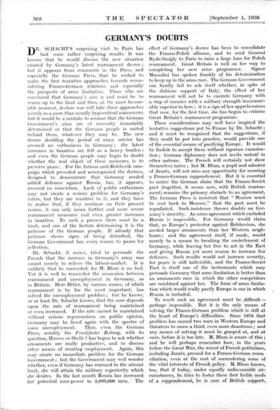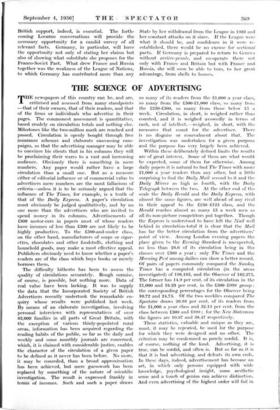GERMANY'S DOUBTS
but it appears from comments in the Press, and especially the German Press, that he wished to make the first tentative approaches towards recon- sidering Franco-German relations and especially the prospects of arms limitation. Those who are convinced that Germany's aim is and must be to rearm up to the limit and then, at the most favour- able moment, declare war will take these approaches merely as a more than usually hypocritical manoeuvre; but it would be a mistake to assume that the German Government's aims are of necessity immutably determined or that the German people is united behind them, whatever they may be. The new decree doubling the period of army service has aroused no enthusiasm in Germany ; the latest increases in taxation are felt as a heavy burden ; and even the German people may begin to doubt whether the real object- of these measures is to preserve peace. For the furious anti-Bolshevik cam- paign which preceded and accompanied the decrees, designed to demonstrate that Germany needed added defences against Russia, has, it appears, aroused no conviction. Lack of public enthusiasm may not create a serious problem for Germany's rulers, but they are sensitive to it, and they have to realise that, if they continue on their present course, it can only mean further and more severe rearmament measures and even greater increases in taxation. To such a process there must be a limit, and one of the factors determining it is the patience of the German people. If already that patience shows signs of being disturbed, the German Government has every reason to pause for reflection.
Dr. Schacht, it seems, tried to persuade the French that the increase in Germany's army was meant merely to relieve the labour-market. It is unlikely that he succeeded, for M. Blum is no fool. Yet it is well to remember the connexion between rearmament and unemployment in Germany, as in Britain. Herr Hitler, by various means, of which rearmament is by far the most important, has solved the unemployment problem ; but he knows, or at least Dr. Schacht knows, that the cure depends upon the rate of rearmament being maintained or even increased. If the rate cannot be maintained without serious repercussions on public opinion, Germany may be faced again with the spectre of mass unemployment. Thus, even the German Press, notably the Frankfurter Zeitung, with its question, Houses or Shells ? has begun to ask whether armaments are really productive, and to discuss other means of creating employment. Again, this may create no immediate problem for the German Government ; but the Government may well wonder whether, even if Germany has rearmed to the utmost limit, she will attain the military superiority which she desires. In the last month Russia has increased her potential man-power to 2,000,.000 men. The effect of Germany's decree has been to consolidate the Franco-Polish alliance, and to send General Rydz-Smigly to Paris to raise a large loan for Polish rearmament. Great Britain is well on her way to completing her new arms programme. Signor Mussolini has spoken frankly of his determination to keep up in the arms race. The German Government can hardly fail to ask itself whether, in spite of the dubious support of - Italy, the effect of her rearmament will not be to encircle Germany with a ring of enemies with a military strength immeasur- ably superior to hers ; it is a sign of her apprehensions that now, for the first time, she has begun to criticise Great Britain's rearmament programme.
These considerations may well have inspired the tentative suggestions put to France by Dr. Schacht ; and it must be recognised that the suggestions, if they could be put into practice, would provide one of the essential means of pacifying Europe. It would be foolish to accept them without rigorous examina- tion ; German diplomacy does not invite naiveté in other nations. The French will certainly not show themselves naive ; but M. Blum, a pupil and admirer of Jaures, will not miss any opportunity for securing a Franco-German rapprochement. But it is essential to notice the German claim that the Franco-Soviet pact (together, it seems now, with British rearma- ment) remains the primary obstacle to an agreement, The German Press is insistent that " Moscow must be sent back to Moscow," that the pact must be repudiated. Such insistence throws doubts on. Ger- many's sincerity. An arms agreement which excluded Russia is impossible. For Germany would claim that, as Europe's protector against Bolshevism, she needed larger armaments than her Western neigh- bours ; and the agreement itself, if made, would merely be a means to breaking the encirclement of Germany, while leaving her free to act in the East and giving Russia yet more reason to increase her defences. Such results would not increase security, for peace is still indivisible, and the Franco-Soviet Pact is itself one of the instruments which may persuade Germany that arms limitation is better than an armaments race in which the other competitors are combined against her. The form of arms limita- tion which would really pacify Europe is one in which Russia is included.
To reach such an agreement must be difficult— perhaps impossible. But it is the only means of solving the Franco-German problem which is still at the heart of Europe's difficulties. Since 1870. that problem has caused two wars in Western Europe and threatens to cause a third, even more disastrous ; and any means of solving it must be grasped at, and at once,. before it is too late. M. Blum is aware of this ; and he will perhaps remember how, in the years before the Great War, the wisest of French politicians, including Jaures, pressed for a Franco-German region ciliation, even at the cost of surrendering, some of the vital interests of French policy. M. Blum knows, too, that if today, . tinder equally unfavourable cir-. cumstances, he tries to foster these first feeble seeds of„ rapprochement„, he, is sure. of British support., British support, indeed, is essential. The forth- coming Locarno conversations will - provide the necessary opportunity for a candid survey of all relevant facts. Germany, in particular, will have the opportunity not only of stating her claims but also of showing what substitute she proposes for the Franco-Soviet Pact. What drew France and Russia together was the weakness of the League of Nations, to which Germany has contributed more than any State by her withdrawal from the League in 1933 and her.constant attacks on it since. If the League were what it should be, and confidence in it were re- established, there would be no excuse for sectional pacts. If Germany is prepared to return to Geneva without arriere-pensee, and co-operate there not only with France and Britain but with France and Russia, she will soon be able to turn, to her great advantage, from shells to houses.







































 Previous page
Previous page